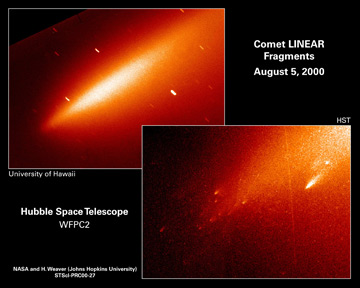Water covers more than 70 percent of Earth’s surface -- most of it in the oceans. But there’s a debate about where all that water came from. Some scientists say that Earth was born wet, while others argue that the water was dumped here later on.
 Hubble telescope pictures of the LINEAR comet, shown above, which was the first comet with a chemistry that indicated its water had the same isotopic composition as the water actually found on Earth. Credit: NASA, Harold Weaver (the Johns Hopkins University), and the HST Comet LINEAR Investigation Team
Hubble telescope pictures of the LINEAR comet, shown above, which was the first comet with a chemistry that indicated its water had the same isotopic composition as the water actually found on Earth. Credit: NASA, Harold Weaver (the Johns Hopkins University), and the HST Comet LINEAR Investigation Team One key bit of evidence is the ratio of hydrogen to heavy hydrogen in today’s oceans. The ratio varied in different regions of the early solar system. So comparing the ratio found in Earth’s oceans to that of other solar-system bodies could tell us where Earth’s water was formed.
So far, the closest match is a class of asteroids. These big chunks of rock contain a lot of water. They formed farther from the Sun than Earth did, but some were shoved our way by the gravity of other planets. The idea goes that a lot of these asteroids hit the young Earth, delivering much of the planet’s water.
But the ratio of hydrogen to heavy hydrogen is about the same in some comets -- mountain-sized chunks of frozen water and gases mixed with rock. They, too, pelted the young Earth.
But there’s growing support for the idea that the water was created along with Earth itself.
The early Earth might have had a bloated atmosphere made of hydrogen. The hydrogen mixed with oxygen to make good old H-2-O. According to this idea, the ratio of hydrogen to heavy hydrogen has changed over time -- until it’s a match for that found in today’s oceans.
No matter where the water came from, though, there’s solid agreement that Earth has been a watery planet for billions of years.

